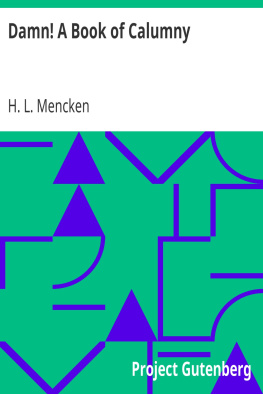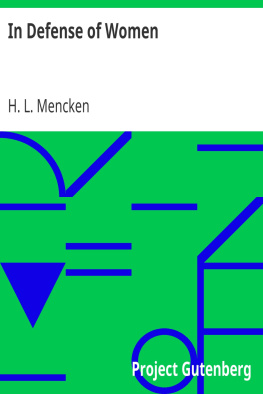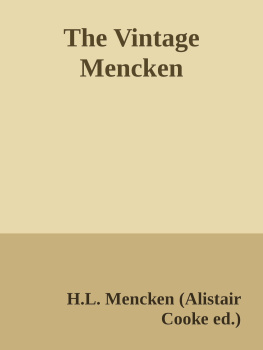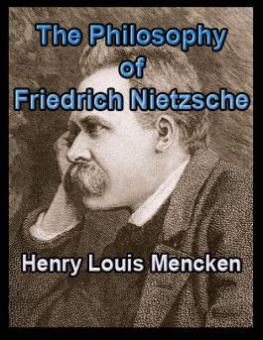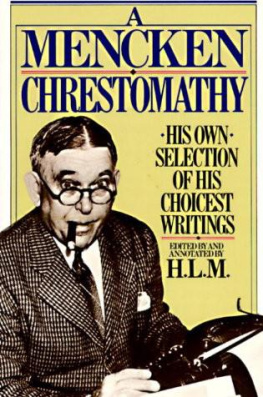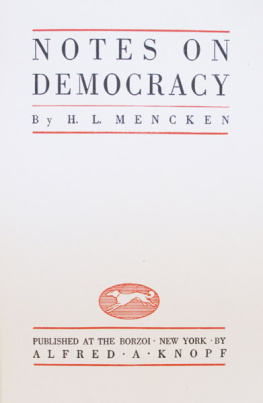Henry L. Mencken - Damn! A Book of Calumny
Here you can read online Henry L. Mencken - Damn! A Book of Calumny full text of the book (entire story) in english for free. Download pdf and epub, get meaning, cover and reviews about this ebook. year: 1918, publisher: Goodman, genre: Science. Description of the work, (preface) as well as reviews are available. Best literature library LitArk.com created for fans of good reading and offers a wide selection of genres:
Romance novel
Science fiction
Adventure
Detective
Science
History
Home and family
Prose
Art
Politics
Computer
Non-fiction
Religion
Business
Children
Humor
Choose a favorite category and find really read worthwhile books. Enjoy immersion in the world of imagination, feel the emotions of the characters or learn something new for yourself, make an fascinating discovery.
- Book:Damn! A Book of Calumny
- Author:
- Publisher:Goodman
- Genre:
- Year:1918
- Rating:4 / 5
- Favourites:Add to favourites
- Your mark:
- 80
- 1
- 2
- 3
- 4
- 5
Damn! A Book of Calumny: summary, description and annotation
We offer to read an annotation, description, summary or preface (depends on what the author of the book "Damn! A Book of Calumny" wrote himself). If you haven't found the necessary information about the book — write in the comments, we will try to find it.
Damn! A Book of Calumny — read online for free the complete book (whole text) full work
Below is the text of the book, divided by pages. System saving the place of the last page read, allows you to conveniently read the book "Damn! A Book of Calumny" online for free, without having to search again every time where you left off. Put a bookmark, and you can go to the page where you finished reading at any time.
Font size:
Interval:
Bookmark:
Title: Damn!
A Book of Calumny
Author: Henry Louis Mencken
Release Date: July 31, 2006 [EBook #18948]
[Last updated: December 20, 2014]
Language: English
Produced by Janet Blenkinship and the Online Distributed
Proofreading Team at http://www.pgdp.net
A hearing of Schumann's B flat symphony of late, otherwise a very caressing experience, was corrupted by the thought that music would be much the gainer if musicians could get over their superstitious reverence for the mere text of the musical classics. That reverence, indeed, is already subject to certain limitations; hands have been laid, at one time or another, upon most of the immortal oratorios, and even the awful name of Bach has not dissuaded certain German editors. But it still swathes the standard symphonies like some vast armor of rubber and angel food, and so imagination has to come to the aid of the flutes and fiddles when the band plays Schumann, Mozart, and even parts of Beethoven. One discerns, often quite clearly, what the reverend Master was aiming at, but just as often one fails to hear it in precise tones.
This is particularly true of Schumann, whose deficiency in instrumental cunning has passed into proverb. And in the B flat symphony, his first venture into the epic form, his failures are most numerous. More than once, obviously attempting to roll up tone into a moving climax, he succeeds only in muddling his colors. I remember one placeat the moment I can't recall where it iswhere the strings and the brass storm at one another in furious figures. The blast of the brass, as the vaudevillains say, gets acrossbut the fiddles merely scream absurdly. The whole passage suggests the bleating of sheep in the midst of a vast bellowing of bulls. Schumann overestimated the horsepower of fiddle music so far up the E stringor underestimated the full kick of the trumpets.... Other such soft spots are well known.
Why, then, go on parroting gaucheries that Schumann himself, were he alive today, would have long since corrected? Why not call an ecumenical council, appoint a commission to see to such things, and then forget the sacrilege? As a self-elected delegate from heathendom, I nominate Dr. Richard Strauss as chairman. When all is said and done, Strauss probably knows more about writing for orchestra than any other two men that ever lived, not excluding Wagner. Surely no living rival, as Dr. Sunday would say, has anything on him. If, after hearing a new composition by Strauss, one turns to the music, one is invariably surprised to find how simple it is. The performance reveals so many purple moments, so staggering an array of lusciousness, that the ear is bemused into detecting scales and chords that never were on land or sea. What the exploratory eye subsequently discovers, perhaps, is no more than our stout and comfortable old friend, the highly well-born hausfrau, Mme. C Durwith a vine leaf or two of C sharp minor or F major in her hair. The trick lies in the tone-colorin the flabbergasting magic of the orchestration. There are some moments in "Elektra" when sounds come out of the orchestra that tug at the very roots of the hair, sounds so unearthly that they suggest a caroling of dragons or bierfischand yet they are made by the same old fiddles that play the Kaiser Quartet, and by the same old trombones that the Valkyrie ride like witch's broomsticks, and by the same old flutes that sob and snuffle in Tit'l's Serenade. And in parts of "Feuersnot"but Roget must be rewritten by Strauss before "Feuersnot" is described. There is one place where the harps, taking a running start from the scrolls of the violins, leap slambang through (or is it into?) the firmament of Heaven. Once, when I heard this passage played at a concert, a woman sitting beside me rolled over like a log, and had to be hauled out by the ushers.
Yes; Strauss is the man to reorchestrate the symphonies of Schumann, particularly the B flat, the Rhenish and the Fourth. I doubt that he could do much with Schubert, for Schubert, though he is dead nearly a hundred years, yet remains curiously modern. The Unfinished symphony is full of exquisite color effectsconsider, for example, the rustling figure for the strings in the first movementand as for the C major, it is so stupendous a debauch of melodic and harmonic beauty that one scarcely notices the colors at all. In its slow movement mere loveliness in music probably says all that will ever be said.... But what of old Ludwig? Har, har; here we begin pulling the whiskers of Baal Himself. Nevertheless, I am vandal enough to wonder, on sad Sunday mornings, what Strauss could do with the first movement of the C minor. More, if Strauss ever does it and lets me hear the result just once, I'll be glad to serve six months in jail with him.... But in Munich, of course! And with a daily visitor's pass for Cousin Pschorr!...
The conservatism which shrinks at such barbarities is the same conservatism which demands that the very typographical errors in the Bible be swallowed without salt, and that has thus made a puerile dream-book of parts of Holy Writ. If you want to see how far this last madness has led Christendom astray, take a look at an article by Abraham Mitrie Rihbany, an intelligent Syrian, in the Atlantic Monthly of a couple of years ago. The title of the article is "The Oriental Manner of Speech," and in it Rihbany shows how much of mere Oriental extravagance of metaphor is to be found in many celebrated passages, and how little of literal significance. This Oriental extravagance, of course, makes for beauty, but as interpreted by pundits of no imagination it surely doesn't make for understanding. What the Western World needs is a Bible in which the idioms of the Aramaic of thousands of years ago are translated into the idioms of today. The man who undertook such a translation, to be sure, would be uproariously denounced, just as Luther and Wycliffe were denounced, but he could well afford to face the storm. The various Revised Versions, including the Modern Speech New Testament of Richard Francis Weymouth, leave much to be desired. They rectify many naif blunders and so make the whole narrative more intelligible, but they still render most of the tropes of the original literally.
These tropes are not the substance of Holy Writ; they are simply its color. In the same way mere tone-color is not the substance of a musical composition. Beethoven's Eighth Symphony is just as great a work, in all its essentials, in a four-hand piano arrangement as in the original score. Every harmonic and melodic idea of the composer is there; one can trace just as clearly the subtle processes of his mind; every step in the working out of the materials is just as plain. True enough, there are orchestral compositions of which this cannot be reasonably said; their color is so much more important than their form that when one takes away the former the latter almost ceases to exist. But I doubt that many competent critics would argue that they belong to the first rank. Form, after all, is the important thing. It is design that counts, not decorationdesign and organization. The pillars of a musical masterpiece are like the pillars of the Parthenon; they are almost as beautiful bleached white as they were in all their original hues.
If I were a woman I should want to be a blonde, with golden, silky hair, pink cheeks and sky-blue eyes. It would not bother me to think that this color scheme was mistaken by the world for a flaunting badge of stupidity; I would have a better arm in my arsenal than mere intelligence; I would get a husband by easy surrender while the brunettes attempted it vainly by frontal assault.
Men are not easily taken by frontal assault; it is only strategem that can quickly knock them down. To be a blonde, pink, soft and delicate, is to be a strategem. It is to be a ruse, a feint, an ambush. It is to fight under the Red Cross flag. A man sees nothing alert and designing in those pale, crystalline eyes; he sees only something helpless, childish, weak; something that calls to his compassion; something that appeals powerfully to his conceit in his own strength. And so he is taken before he knows that there is a war. He lifts his portcullis in Christian charityand the enemy is in his citadel.
Font size:
Interval:
Bookmark:
Similar books «Damn! A Book of Calumny»
Look at similar books to Damn! A Book of Calumny. We have selected literature similar in name and meaning in the hope of providing readers with more options to find new, interesting, not yet read works.
Discussion, reviews of the book Damn! A Book of Calumny and just readers' own opinions. Leave your comments, write what you think about the work, its meaning or the main characters. Specify what exactly you liked and what you didn't like, and why you think so.

